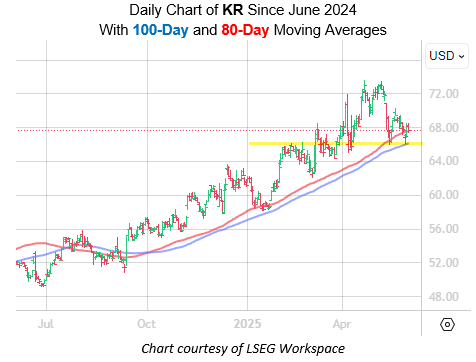Bitcoin Is Quietly Entering The Healthcare Sector
NEW YORK, NEW YORK - From 2022 to 2023 the average increase of drug prices in the U.S. was 15.2%, ... More higher than the inflation rate, according to the U.S. Department of Health and Human Services. (Photo by Spencer Platt/Getty Images)
Bitcoin has made inroads into finance, energy, and even politics. Now, a growing number of healthcare companies are embracing it.
Not only as a hedge or a balance sheet asset, but also as a guiding philosophy and potential infrastructure layer. The move may seem unlikely, given healthcare’s deeply regulated and bureaucratic nature. But that’s precisely the point.
For companies like CrowdHealth and Semler Scientific, Bitcoin's appeal isn't speculative. It’s structural. In a sector inundated with reverse incentives, opaque pricing, and costly middlemen, Bitcoin offers transparency.
The Current U.S. Healthcare System
The U.S. healthcare system is worth roughly $5 trillion, averaging over $17,000 per person. Even with the high costs associated with health insurance, claims are often denied.
Andy Schoonover, founder and CEO of CrowdHealth, experienced this firsthand. His insurer refused to pay an $8,000 bill for his daughter’s ear tube surgery, despite doctors deeming it medically necessary.
Soon after, he dropped his insurance and began building a cash-pay model that eventually became CrowdHealth. A peer-to-peer platform where members fund one another’s healthcare needs.
In this process, he found a natural audience among bitcoiners.
Bitcoiners Circularity in Healthcare
Schoonover, who told Forbes in an interview he holds roughly 80% of his liquid assets in Bitcoin, says the overlap wasn’t accidental.
“Bitcoiners understand incentives,” he said. Schoonover believes that as patients dig deeper into the healthcare system, it becomes clear that hospitals, health networks, and government policies often work against patients’ best interests. A pattern quickly recognized by bitcoiners.
CrowdHealth allows members to pay a monthly fee, directly contributing to each other’s care. In return, they avoid premiums and networks.
Schoonover said their model has grown to over 10,000 members.
CrowdHealth is leaning further into Bitcoin by letting users invest unused healthcare funds into bitcoin. The long-term vision, according to Schoonover, is Bitcoin circularity in healthcare.
“If we can build bitcoin circularity within healthcare we believe that will go a long way in normalizing bitcoin as a medium of exchange,” Schoonover said.
Unlike insurance, CrowdHealth doesn’t guarantee payment. However, Schoonover claims that the community fully funds over 99% of eligible bills.
Applying Bitcoin’s Philosophy to Strengthen Healthcare and Finance
While CrowdHealth integrates Bitcoin at the user level, Semler Scientific takes a top-down approach. The publicly traded medtech company adopted Bitcoin as its primary treasury reserve asset in 2024, becoming one of the first healthcare companies to do so.
For Semler chairman Eric Semler, Bitcoin represents resilience, scarcity, and alignment, traits sorely lacking in the healthcare system.
“Bitcoin is monetary freedom,” Semler told Forbes. “We’re freeing people medically through early detection, and Bitcoin helps us stay strong financially.”
The company’s core product, QuantaFlo, is an FDA-cleared diagnostic tool for vascular disease. It enables early detection of cardiovascular issues, allowing for timely and potentially life-saving interventions.
Semler emphasized the importance of early detection and noted that healthcare could benefit from adopting principles found in Bitcoin’s design, such as decentralization, transparency, and reducing reliance on middlemen.
Turning to Bitcoin in Healthcare as a Strategic Asset
In an interview with Forbes, Eric Semler of Semler Scientific explained that their Bitcoin strategy isn’t just about protecting cash in an inflationary environment. It’s about owning the digital future. The company is exploring ways to mine Bitcoin creatively and integrate value into its shareholder model.
“We’re in acceleration mode,” Semler said. “We’re not just buying Bitcoin, we’re adding value to our value.”
In 2023, Semler became active in the company his father had founded. He joined the board to improve capital allocation and saw Bitcoin as the obvious next step, following Michael Saylor’s Strategy concept.
“It was a last resort in the best way.” Bitcoin offered a neutral reserve asset with no counterparty exposure or political entanglements, making it a good fit.
Leading a Slow but Strategic Shift
Despite its early-mover status, Semler Scientific remains a rarity. Semler said that few medtech or biotech peers have followed suit. One exception is KindlyMD, a company that shares philosophical alignment but little market overlap.
Still, he believes healthcare is well-positioned to lead a treasury shift.
Healthcare companies generate steady cash flow, operate under strict regulations, and require long-term resilience, which according to Semler, makes Bitcoin a natural fit.
That shift may be slow, but for now, Semler is content leading the charge.
The Overlap Between Healthcare and Bitcoin
The future of Bitcoin in healthcare, according to companies like CrowdHealth and Semler Scientific, is not about layering crypto onto a broken system. It is about rebuilding that system from the ground up using first principles. They see Bitcoin with the potential to help make healthcare more affordable, build trust by putting patients in control, protect savings from inflation, and support better systems for sharing medical information.
Schoonover envisions a future where bitcoiners fund one another’s procedures and doctors accept bitcoin directly, cutting out insurers entirely. Semler imagines a more robust, future-proof treasury model that gives healthcare companies stronger balance sheets and global leverage.
How Bitcoin Could Help Reshape Healthcare's Broken System
Bitcoin won’t eliminate the need for regulation, nor will it immediately replace legacy players. But it does offer some interesting options.
The examples of CrowdHealth and Semler Scientific suggest that some healthcare companies are exploring Bitcoin not for its popularity, but as a response to challenges in the current system.
Content Original Link:
" target="_blank">















































